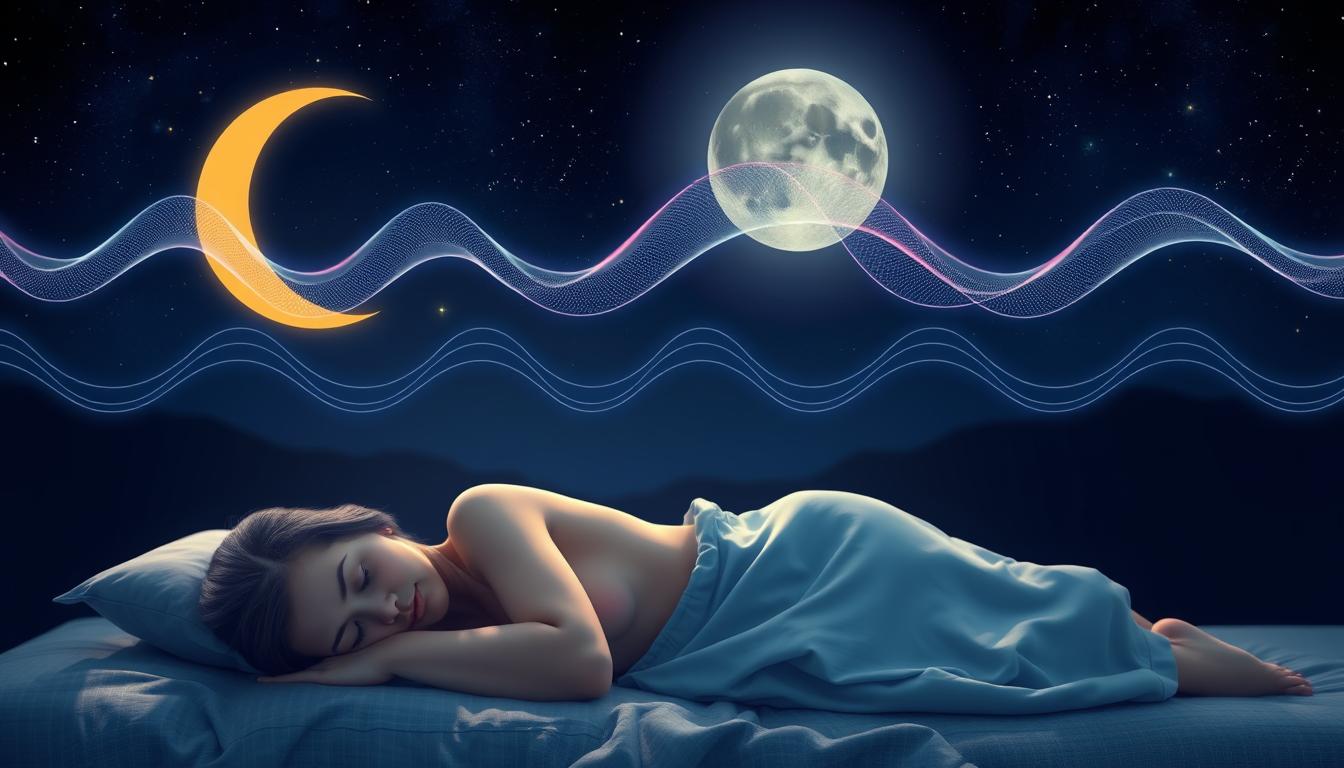Do you wake up early, ready to take on the day? Or do you feel most alive when the sun goes down? Your answer tells us a lot about your internal clock.
Knowing if you’re a morning or evening person isn’t just about what you like. It’s about your DNA. Some people are naturally more alert in the morning, while others shine later in the day.
Your body’s internal clock does more than just tell you when to sleep. It affects your mood, creativity, and how you make decisions. This cycle impacts your work, relationships, and more.
Figuring out your natural sleep-wake cycle can change your life. By following your body’s rhythm, you can boost your productivity and health. This simple change can make you happier and more fulfilled.
Understanding Chronotypes
Ever wondered why some people wake up early, while others stay up late? It’s all about your chronotype. This is a part of human biology that controls your energy levels. It’s like a personal schedule that tells you when you’re most alert and ready to sleep.
Your chronotype isn’t something you can choose. It’s a natural part of you, shaped by your body’s internal systems. Just like flowers bloom at different times, humans have natural times for being active and resting.
What Are Chronotypes?
Chronotypes are your body’s natural preference for when to be awake and when to sleep. They’re controlled by your internal clocks. These clocks are like a timing system that runs in the background of your life.
Most people fall into three main categories. Morning types, or “larks,” are most alert early. Evening types, or “owls,” do better later in the day. And then there are those who fall somewhere in between.
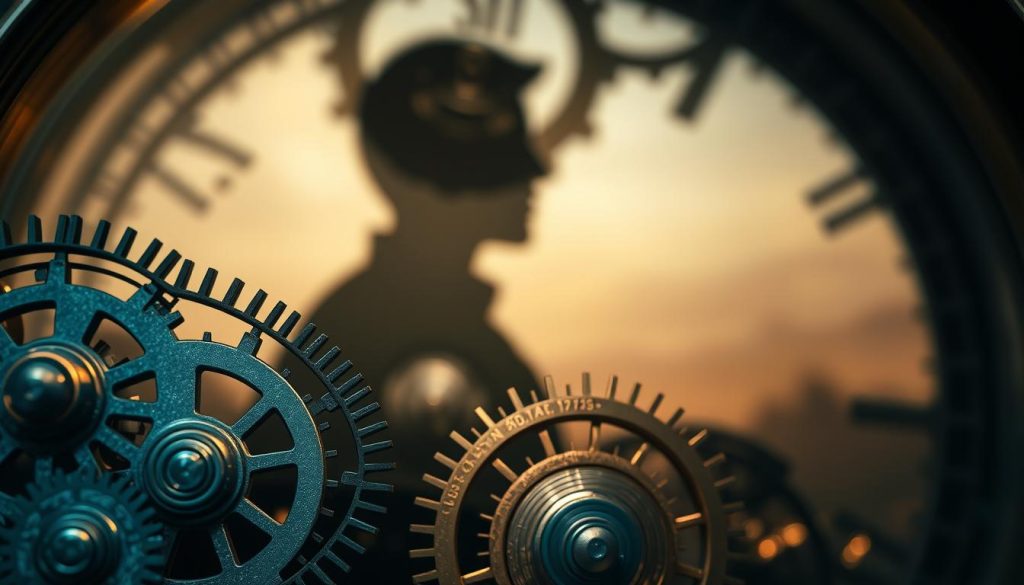
Your chronotype affects more than just sleep. It influences your mood, how well you think, and even your appetite. Knowing your natural rhythm helps you plan your day better and avoid feeling tired when you should be awake.
The Science Behind Chronotypes
Chronobiology is the study of our internal timing systems. At the heart of this is a small brain area called the suprachiasmatic nucleus, or SCN. This area works with hormones to control our sleep-wake cycles.
Two hormones are key in your chronotype. Melatonin tells your body it’s time to sleep, while cortisol wakes you up. The timing of these hormones varies, leading to different chronotypes.
Genetics play a big role in your chronotype. About 50% of your timing preferences come from your parents. But, your environment also affects your biological clocks. Light, work schedules, and lifestyle choices can change how your clocks work.
Your chronotype can change over time. Kids tend to wake up early, while teens prefer later hours. As we age, we often go back to waking up earlier. This shows how our internal clocks adapt to different life stages.
The Characteristics of Morning Chronotypes
Understanding morning people goes beyond just discipline. They naturally wake up with the sun. Their bodies follow a rhythm that matches the day’s light.
About 25% of people are morning types. They feel most energetic in the morning. Their natural clocks work differently, giving them an edge in society.
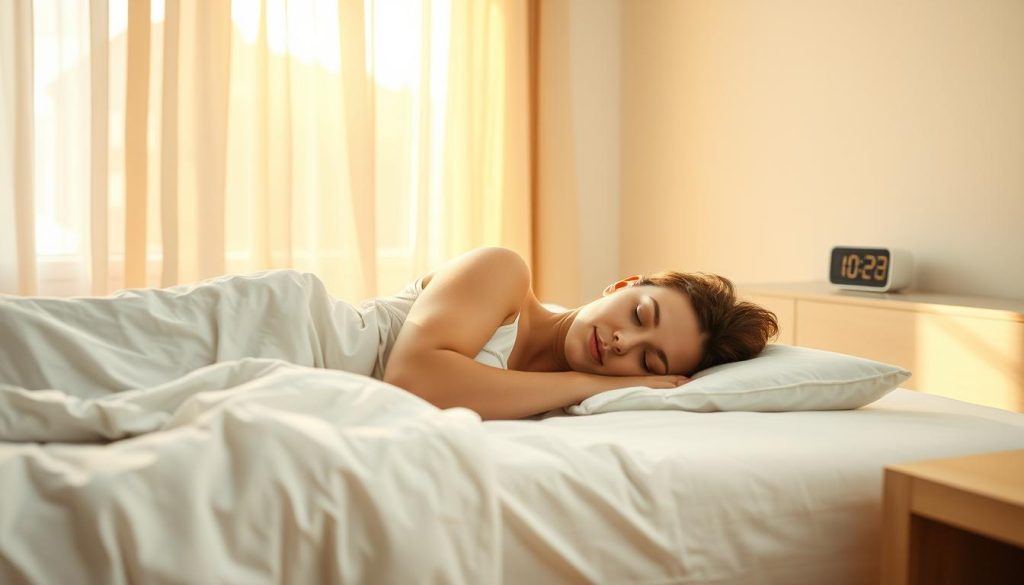
Natural Sleep Rhythms
Morning people start to feel tired around 9 or 10 PM. This is when their body says it’s time to sleep. They don’t need to use tricks to fall asleep.
They wake up between 5 and 7 AM feeling refreshed. Their sleep schedule is consistent, even on weekends. This keeps their body’s clock in sync.
Their sleep is deepest between 10 PM and 2 AM. This is when they get the best rest. Their REM sleep matches this time perfectly.
They are most alert from 6 AM to noon. Their minds work best during these hours. They can handle tough tasks without needing coffee.
Benefits of Early Rising
Morning people have many benefits. Their natural sleep fits well with work hours. They start the day full of energy, unlike others who are still waking up.
They are more proactive and get things done early. This helps them succeed in their careers and keeps stress low.
They get more sunlight in the morning. This improves their mood and helps with vitamin D. They might even be less likely to get depressed.
They also have better heart health. Their sleep patterns support a healthy heart. Regular sleep times help keep blood pressure stable and reduce inflammation.
Morning people fit well into society. They can handle early meetings and events easily. This makes their lives less stressful and easier to plan.
The Characteristics of Evening Chronotypes
People with evening chronotype preferences feel most alive later in the day. They are called night owls and are most productive from 6 PM to midnight. Their natural energy peaks in the evening, bringing both benefits and challenges to their lives.
About 25% of the population are evening people. They have traits that differ from those who wake up early. Knowing these differences helps us see why night owls do well in some situations but not others.
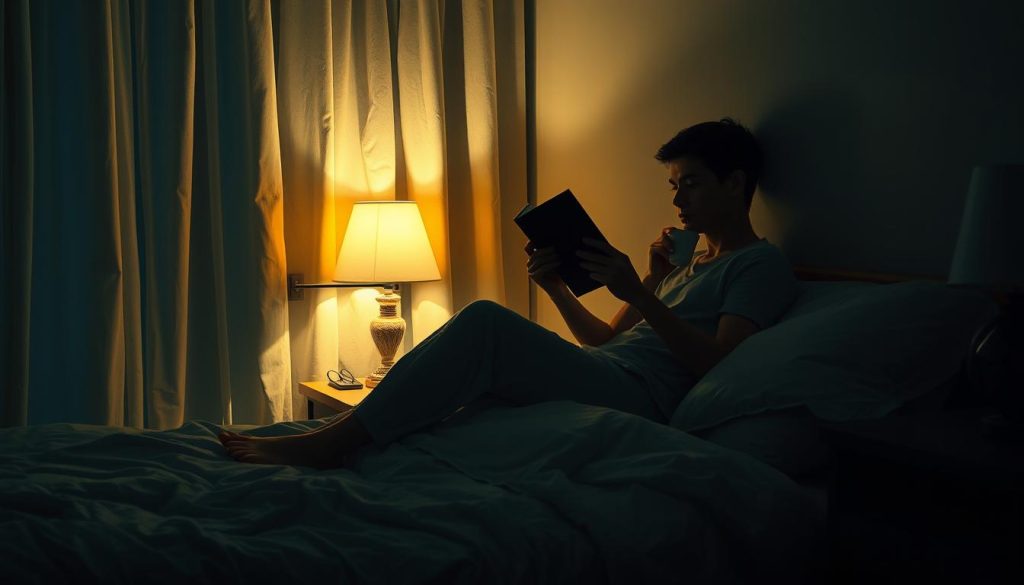
Sleep Patterns of Evening People
Night owls sleep differently than early risers. They usually don’t go to bed until 11 PM or later. This isn’t because they’re lazy or have bad habits. It’s because their body clocks work differently.
Evening people get their best sleep later at night. They wake up between 8 AM and 10 AM. Their sleep patterns include:
- Delayed sleep onset (falling asleep after 11 PM)
- Deeper sleep during morning hours
- Natural wake times between 8-10 AM
- Peak alertness occurring in evening hours
Advantages of Being an Evening Person
Evening chronotypes have amazing strengths. Research shows they are more creative and solve problems better. Their brains are wired for thinking creatively in the evening.
Evening people have many advantages, including:
- Enhanced creative thinking and artistic abilities
- Superior problem-solving skills during evening hours
- Greater cognitive flexibility and adaptability
- Higher scores on certain intelligence measures
- Better performance on complex tasks after 6 PM
They often do well in jobs that need creativity, analysis, or evening work. Their natural rhythm fits well with certain careers and lifestyles.
Common Challenges Faced by Evening People
Despite their strengths, night owls face big challenges in a society that values mornings. Their natural rhythm often clashes with required schedules. This can hurt their health.
Evening people often struggle with:
- Difficulty with early morning commitments
- Social jet lag from misaligned schedules
- Societal bias toward morning productivity
- Potential health impacts from fighting natural rhythm
- Reduced performance during morning hours
These challenges are real. Evening chronotypes aren’t being lazy or difficult. They’re just fighting against their natural rhythm. Understanding this can help create better environments for night owls to succeed.
How to Identify Your Chronotype
Discovering your chronotype is a journey of self-discovery. It changes how you see your daily routine. Knowing your natural sleep-wake cycles lets you work with your body, not against it. You don’t need expensive tests or complicated procedures to find out your chronotype.
Your body already has all the clues you need. The trick is learning to recognize and understand these natural signals.
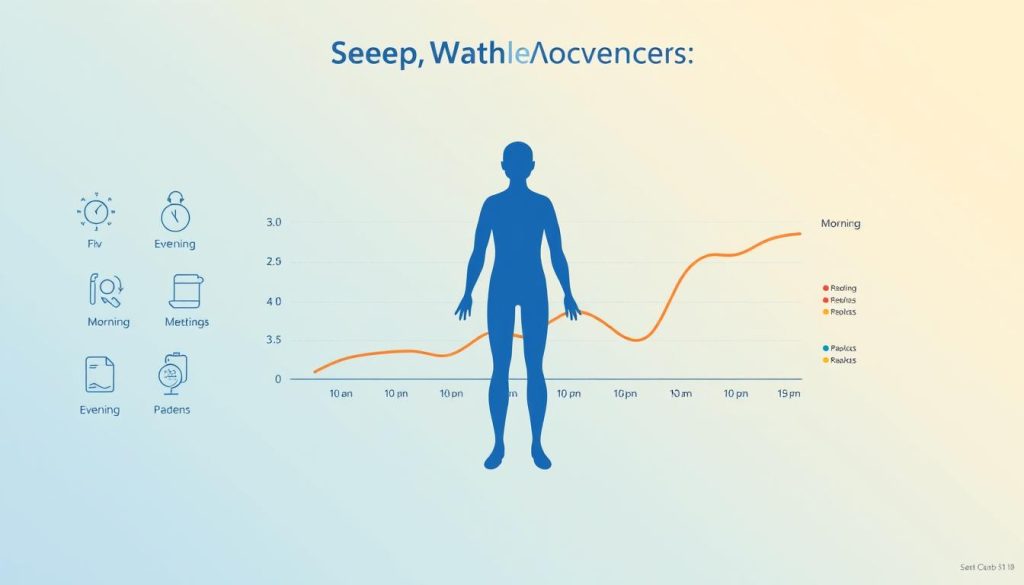
Self-Assessment Techniques
The best way to find your chronotype is through self-observation. Start by thinking about your natural patterns on free days, when you’re not tied to work or school.
Ask yourself these key questions:
- What time do you naturally fall asleep when you have no obligations the next day?
- When do you wake up without an alarm clock during weekends or vacations?
- At what time of day do you feel most alert and energetic?
- When do you prefer to exercise or do mentally demanding tasks?
- What time do you naturally feel hungry for your main meals?
For a more structured approach, use the Morningness-Eveningness Questionnaire (MEQ). This tool asks about your sleep and wake times, peak performance hours, and daily activity preferences.
Pay close attention to your patterns during vacation periods. These times show your true chronotype because external pressures don’t affect your sleep-wake cycles. Many people find their natural rhythms differ a lot from their weekday schedules.
Factors Influencing Your Chronotype
Several factors shape your chronotype. Knowing these influences helps you understand your natural rhythms and how they might change over time.
Age is a big factor in determining your chronotype. Teenagers and young adults tend to be evening types, staying up late and sleeping in. As people get older, they usually become morning types, waking up earlier and feeling tired sooner in the evening.
Genetics also play a big role in your chronotype. Research shows that chronotype preferences run in families, suggesting a strong hereditary component. If your parents were night owls, you’re more likely to be one too.
Environmental factors can also change your natural tendencies:
- Light exposure patterns throughout the day
- Work schedules and social obligations
- Caffeine consumption habits
- Exercise timing and intensity
- Screen time before bedtime
Remember, your chronotype can change throughout your life. Hormonal changes, lifestyle changes, and aging all affect your sleep-wake cycles. Understanding these factors helps you make informed decisions about your daily routines and sleep habits.
The Impact of Chronotypes on Daily Life
Your internal clock controls your performance, relationships, and happiness. It affects your career and family life. Knowing this helps you choose the best times for tasks and social events.
Many people don’t realize how much their chronotype affects their day. It doesn’t just decide when you sleep. It also shapes your mood, decisions, and personality at different times.
Work Performance and Productivity
Your chronotype affects your work success. Morning types do well in early meetings and planning. They solve complex problems with a clear mind in the morning.
Evening types face challenges in traditional jobs. They’re most creative and solve problems better in the afternoon and evening. But, offices usually close then.
- Morning people focus best from 6 AM to 10 AM
- Evening types perform best from 2 PM to 6 PM
- Intermediate types stay productive from 10 AM to 2 PM
- All types feel tired around 1-3 PM
Smart employers offer flexible hours. This helps evening types work when they’re most productive. It makes everyone happier and more productive.
Social Interactions and Relationships
Your chronotype affects your social life and relationships. Couples with different sleep times often find it hard to spend quality time together. One might want to talk, while the other wants to relax.
Evening people often struggle in a morning world. Weekend breakfasts are tiring, but late nights energize them. This can make them feel left out or misunderstood.
Knowing about chronotypes can make relationships better:
- Partners can talk when both are most awake
- Families plan activities that fit everyone’s energy
- Friends meet at times that work for everyone
- Work teams give tasks based on when people do best
Good relationships respect each other’s natural rhythms. Morning types value their partner’s evening creativity. Evening types understand their partner’s need for early sleep. This understanding strengthens relationships and reduces conflicts.
Your chronotype is not a limitation. It’s valuable for improving your life and relationships.
Tips for Adjusting Your Schedule Based on Your Chronotype
Knowing your chronotype helps you make changes that boost your daily life. It’s about working with your natural energy, not against it. By optimizing your schedule, you can feel and perform better all day.
Even small changes can make a big difference. You don’t need to change everything at once. Focus on making smart, strategic changes that respect your natural rhythm and meet your daily needs.
Maximizing Your Natural Morning Energy
Morning types have an edge in our society. Do your toughest tasks from 6 AM to 10 AM when you’re most alert. This way, you can handle big projects when your brain is at its best.
Make sure to wind down in the evenings. Avoid caffeine after 2 PM and have a regular bedtime routine. Your body likes routine, so keep the same sleep schedule every day, even on weekends.
Beat the afternoon slump with short breaks. Take a 10-minute walk or stretch around 2 PM. Also, avoid big meetings when you’re naturally tired, from 1 PM to 3 PM.
Stay connected with friends by suggesting early coffee dates or dinner. Your evening friends will thank you, and you’ll feel more awake during these times.
Thriving as a Night Owl in a Morning World
Evening types face special challenges in our morning world. But, with the right schedule, you can thrive. Try bright light therapy for 20-30 minutes each morning to help adjust your body’s clock. This can make mornings easier.
Ask for flexible work hours if you can. Many places now value productivity over strict schedules. Show them when you’re most productive to get later start times.
Plan your evening routine to match your natural energy. Do creative work, exercise, or social activities from 6 PM to 10 PM. This way, you use your best energy hours.
Get ready for the morning the night before. Choose clothes, pack lunches, and prep your workspace in the evening. This saves you stress and energy in the morning.
Give yourself extra time in the morning. Your brain takes longer to wake up. So, plan for extra time for commuting and morning tasks to avoid feeling rushed.
Conclusion: Embracing Your Chronotype for a Happier Life
Your chronotype is a natural part of you, not something to fix. Knowing if you’re a morning person or a night owl can lead to better health and stronger relationships. It also helps you perform better in all areas of life.
Your Natural Rhythm Matters
Accepting your chronotype means seeing the value in both morning and evening types. Early risers do well in morning meetings and workouts. Night owls shine in late-night projects. They’re just different ways of being human.
Studies show that working with your natural sleep cycle reduces stress and boosts happiness. Fighting your chronotype only adds to your stress and limits your success.
Making Changes That Work
Aligning your lifestyle doesn’t need big changes. Small tweaks can make a big difference. For example, morning people can do important tasks before noon. Evening types might start work later or do creative work after dinner.
Begin by finding one area where your schedule clashes with your chronotype. Make small changes that respect your natural energy. Your body and mind will thank you for it.
See your chronotype as a strength, not a weakness. When you align with your biology, you reach your full potential for a happier, more productive life.

